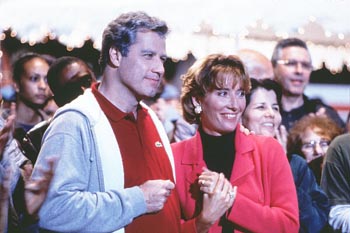Primarily Colorless
Roman á Clinton: John Travolta, looking like a certain chief executive, hits the campaign trail with an adoring Emma Thompson in tow.
Mike Nichols' presidential satire is more nice than naughty
AFTER HEARING the extravagant praise heaped on the novel Primary Colors, I read the book and discovered that what had been heralded as a tale worthy of Robert Penn Warren and Evelyn Waugh was really more like Mark Russell and the Capitol Steps. The book, by then-Newsweek reporter Joe Klein posing as "Anonymous," was obviously written with a film deal in mind; it had lots of terribly broad dialect, a three-act structure and a raging middle-aged female character just right for Midler, MacLaine or whomever. (Kathy Bates got the part of Libby, a lesbian assistant to the Clinton figure. She's shameless.) What's good about the movie is that screenwriter Elaine May has softened the patronizing quality of the novel, changing it into old-time movie populism. It still isn't a very good film, but it's a canny, professional adaptation.
Director Mike Nichols' efforts to sell the film on its own merits seem awfully disingenuous: didn't he know Primary Colors was a roman a clef when he paid $1.5 million for it? The story features a thinly veiled Clinton (John Travolta doing more of an impersonation than a performance), a yet more thinly veiled campaign manager on the lines of James Carville (Billy Bob Thornton) and Emma Thompson--a much less lacquered spouse than Hillary, and the one lead that gives an original performance, not a caricature. In the primaries, Travolta's Jack Stanton matches wits with an avuncular, teflon-coated candidate (Larry Hagman) who is even more vaguely populist than Stanton himself. Stanton's promiscuity harms his chances: his affair with a Gennifer Flowers-like hairdresser is exposed, and he faces a paternity suit by the daughter of a good buddy who runs a barbecue joint.
As played by the demure Adrian Lester, the narrator, Henry, is sort of a demographic everyman. In the book, he was the Afro-WASP grandson of a Martin Luther King figure, who is exposed to the gibes of a nastily caricatured black nationalist, possibly Jesse Jackson. One of the movie's smart decisions was to dump these elements, but the film Primary Colors is still a lecture on the wisdom of blending in quietly as opposed to getting involved in adversarial politics. (Check out the way Nichols handles the crowd of weirdos protesting in New York, an incident straight out of Klein's book.) But what you get as a reward when you sacrifice your identity and principles is vague: all we know of Stanton's politics is that we'd vote for John Travolta because of his irresistible smile and his bathed-in-buttermilk charm.
Primary Colors is pastel compared to Bimbogate, and there are more important reasons to find fault with Clinton than his bedroom morals. The supposed naughtiness of Primary Colors is in portraying Clinton as a doughnut-inhaling lover of barbecued pork and over-made-up women. It seems that Clinton's main fault isn't that he's not presidential, but that he isn't imperial. That's why the mass media had such a party with the alleged wickedness of Primary Colors. But the movie demonstrates the inability of a weak preppy satire to match the ridiculousness of real political life. Hopefully, the muck stops here.
[ San Jose | Metroactive Central | Archives ]
![]()

Francois Duhamel
Primary Colors (R; 135 min.), directed by Mike Nichols, written by Elaine May, starring John Travolta, Emma Thompson and Billy Bob Thornton.
From the March 26-April 1, 1998 issue of Metro.
![[Metroactive Movies]](/movies/gifs/movies468.gif)